A Reading School

It is difficult to argue against how important reading is when children are growing up and trying their best to be aspirational and studying a variety of subjects at school. Not being able to read to your correct age means that you struggle much more just attempting to understand what is being said and written. When you consider that only 73% of pupils leaving primary school reached the expected level for reading in 2019, it is clear that many of those pupils will struggle to access the secondary school curriculum.
At Tudor Grange Samworth Academy, we are aspirational for every single child that is in our care. We understand what is required to improve and are taking further decisive action to make sure this happens. We want our students to be confident and happy in their studies. After analysing reading assessments, we now realise that a pressing concern is ensuring that all students in the academy should be able to read to their chronological age as a bare minimum. The reasons for this are threefold; reading is an integral skill needed to understand and interact with teachers and peers at school, reading is one of the strongest indicators of future earnings and the enjoyment of reading has been reported as more important for children’s educational success than their family’s socio-economic status (OECD, 2002 – Research evidence on reading for pleasure). We want so much for all of the children that attend TGSA. Alongside their personal growth, happiness and accumulation of useful knowledge for their future life, we also want to ensure that they have a voice and meaning to their adult professional life. This starts in the home, the classroom and with the way in which they understand the world around them.
However, as important as reading is for educational purposes, it is essential to help you in day-to-day life. As teachers, we are expert readers. We have studied at university level and we understand the demand of independent reading to learn. Pupils are novice readers. No matter what their current reading level, we have a responsibility to help them progress. English is the language of all of our subjects. For pupils to be able to progress as learners throughout their lives they need to be able to read to learn – and increasingly difficult texts.
Research
We are an academy that centres all of our practices around research. To become experts, we must listen to experts. When approaching the science of reading, we have made great steps in reading, researching, testing and discussing the best approaches for our children. This research has led to a plan to enable all students in the academy to read every day with a variety of texts and to enable them to have a specific reading lesson.
Research analysis comparing the engaged reading time of 2.2 million students found that – 0-5 mins per day = well below national average 5-14 mins per day = sluggish gains, below national average 15+ mins = accelerated reading gains 20 mins per day = likely score better than 90% of their peers on standardized tests.
National Centre for Education Statistics
To this end, we begin every day with reading. The Primary gates open at 8.20 am and children are encouraged to come into class and spend ten minutes reading before the official start of the day at 8.30 am. Following registration, they then move into a half an hour reading group where specific reading knowledge is developed in small groups with texts targeted to each child’s reading ability. Following this, children study a text together in their English lesson. We have chosen these texts to reflect the best of children’s literature from the past and present:
| Year Group | Texts |
|---|---|
| Pre School/Nursery | Where’s Spot, Dear Zoo, You Choose, We’re Going on a Bear Hunt, Brown Bear, Brown Bear What do you see, Jaspers Beanstalk, The Very Hungry Caterpillar, Hairy Mclary from Donaldson’s Diary, Each Peach, Pear Plum, Hug, The Train Ride, Come on Daisy, Beat Baby |
| Reception | Old Woman That Lived in a Shoe, Bog Baby, Owl Babies, Gruffalo, Handa’s Surprise, Mr Gumpy’s Outing, Rosie’s Walk, Six Dinner Sid, Mrs Armitage, Whatever Next, On the Way Home, Farmer Duck, Goodnight Moon, Shhhh, Tiger That Came to Tea, Lighthouse Keeper’s Lunch, Pumpkin Soup, Rama & Sita |
| Year 1 | Where the Wild Things Are, Lost and Found, The Name Jar, Beegu, Burglar Bill, Voices in the Park |
| Year 2 | Three Little Pigs and the Big Bad Wolf, The Day the Crayons Quit, Amazing Grace, George’s Marvellous Medicine, The Tempest (Shakespeare), Leaf |
| Year 3 | Kindlekrax, Lost Happy Endings, One Plastic Bag, The Lion, the Witch and the Wardrobe, The Butterfly Lion, The Iron Man |
| Year 4 | Cloudbusting, Charlotte’s Web, The Village that Vanished, Max and the Millions, The Firework Maker’s Daughter, The Miraculous Journey of Edward Tulane |
| Year 5 | There’s a Boy in the Girl’s Bathroom, Oliver Twist, A Kind of Spark, The Explorer, The Highwayman, Floodland |
| Year 6 | Holes, Letters from a Lighthouse, Fly Me Home, Skelig, A Midsummer Night’s Dream (Shakespeare), Clockwork |
In Secondary, Tutor time starts at 8.30 am and finishes at 8.50 am. Between 8.50 am and 9.15 am, we have a 25-minute reading lesson. This falls into the category of ‘accelerated reading gains.’
Each of the groups have been formed based on tests we have carried out that tell us the current reading ages. We have the following groups:
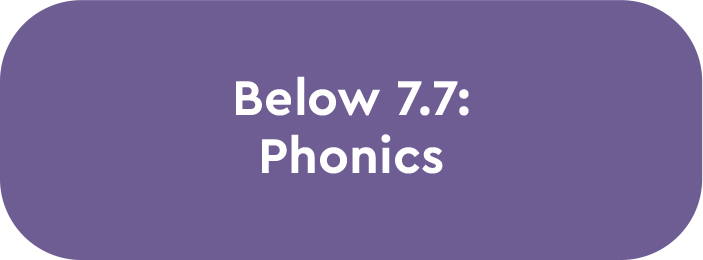
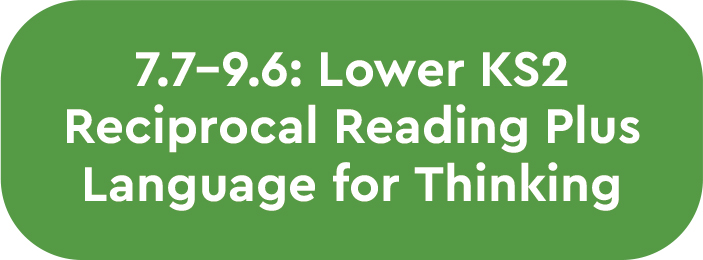
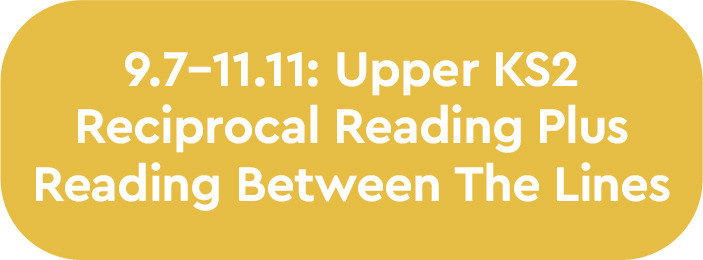
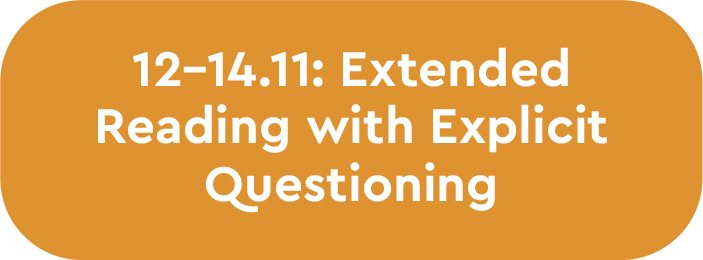
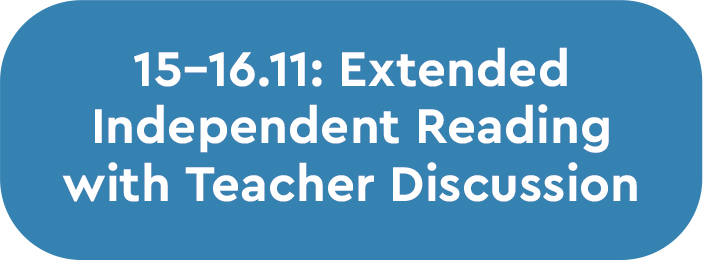

Each morning in the reading lesson, the children will be read part of a novel by the teacher. At specific points there will be work on vocabulary that helps understanding of what is about to be read. Where appropriate, other activities will be introduced to help the children to understand, contextualise and say individual words. Each of the groups is designed to address a certain skill that some children need to relearn or simply become better at. As you will appreciate, understanding and developing the vocabulary knowledge of students is vital in helping them to understand the challenging texts we are offering. In order to make vocabulary learning more straightforward and to monitor progression, we have invested in an online learning platform called Bedrock learning. This is a research-based tool that helps children to hear, understand and use complex vocabulary. We will be launching Bedrock in the coming weeks for all pupils. All children have access to it and the expectation for all pupils in Key Stage 3 is that they complete two hours minutes of Bedrock every week and Key Stage 4 will complete 1 hour a week with additional work from specific subjects to prepare for examinations. Tutors will monitor the learning on Bedrock and inform parents on completion rates.
The literature covered throughout secondary:
| Year 7 | Year 8 | Year 9 | KS4 |
|---|---|---|---|
| Boy in the Striped Pyjamas | Sherlock Holmes | Frankenstein | The Strange Case of Dr Jekyll and Mr Hyde |
| Identity poetry | Dystopian literature | Othello | An Inspector Calls |
| Richard III | The Crucible | War poetry and poetry from other cultures | Power and conflict poetry anthology |
| Macbeth: Shakespeare |
Along with the reading lesson texts:
- The Hunger Games – Suzanne Collins
- Of Mice and Men – John Steinbeck
- The Lovely Bones – Alice Sebold
- The Book Thief – Markus Zusak
- Stories of your Life – Ted Chiang
- Exhalation – Ted Chiang
- The Hate U Give – Angie Thomas
- They Both Die at the End – Adam Silvera
- The Song of Achilles – Madeline Miller
- The Diary of a Young Girl – Anne Frank
- Black and British: A short, essential history – David Olusoga
- A Brief History of Everyone Who Ever Lived – Adam Rutherford
- The Great Gatsby – F. Scott Fitzgerald
- Never Let Me Go – Kazuo Ishiguro
- The Truth of Things – Anthony McGowan
- Shakespeare: The World As A Stage – Bill Bryson
- On This Day in History – Dan Snow
- When Breath Becomes Air – Paul Kalanithi
- Prisoners of Geography – Tim Marshall
- While the Storm Rages – Phil Earle
- Brave New World – Aldous Huxley
- I, Robot – Isacc Asimov
- We Can Remember It For You Wholesale – Philip K. Dick
- Fahrenheit 451 – Ray Bradbury
- In Cold Blood – Truman Capote
- The Catcher in the Rye – J. D. Salinger
- Things Fall Apart – Chinua Achebe
- Picture of Dorian Gray – Oscar Wilde
- The Wolf Road – Richard Lambert
- What If? – Randall Munroe
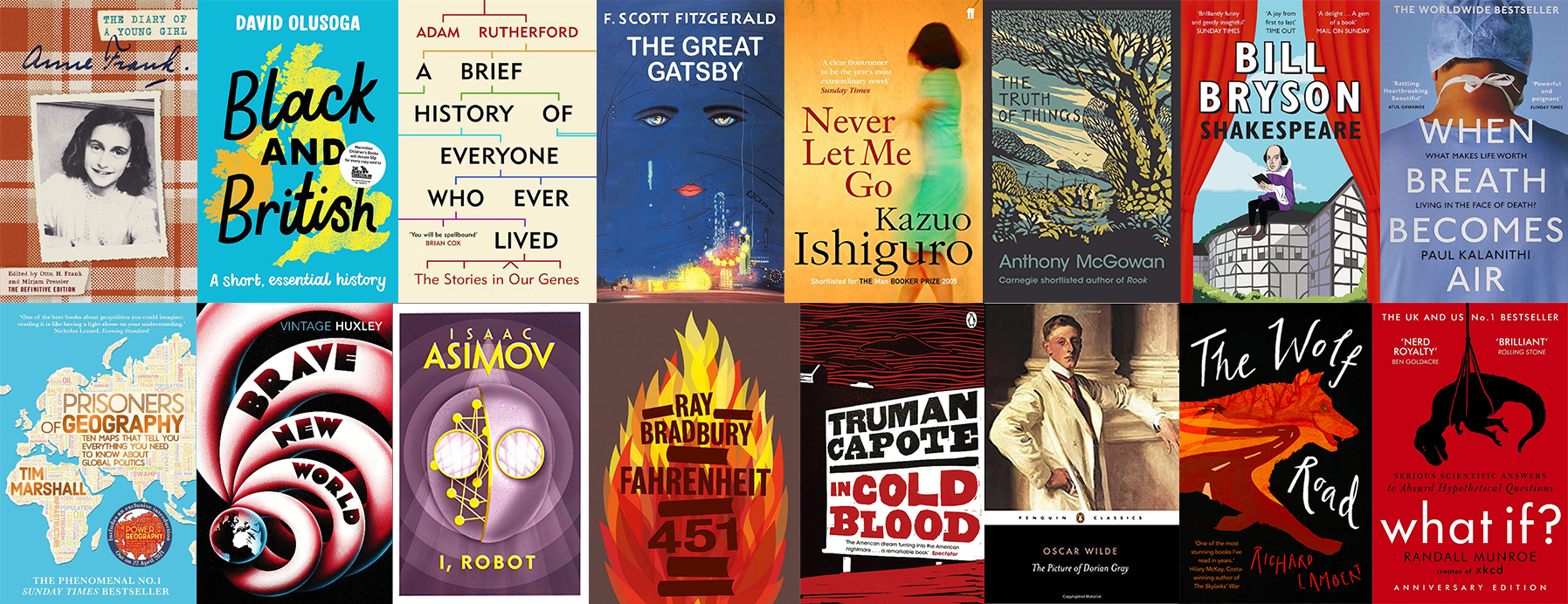
Funding
The programme is funded by Tudor Grange Trust as part of a trust wide concentration on reading and with the help of sponsorship from the Foyle Foundation. There has been a large financial investment in the library services we provide and the books needed to carry out our reading lessons. This investment into the resources ensures that the programme reaches all 850 children in the academy from primary through to secondary.
What role do parents have to play?
Without parents this won’t work; it is quite that simple.
We really want the children in our care to value reading as they value an excellent education, the need to achieve highly and receive high quality qualifications. However, we also understand how daunting this is. Below I have outlined a few things that might be helpful for parents to ensure that you are being as effective as possible in helping your child(ren) to make the most of this opportunity.
- Talk to your child(ren) about their reading. Ask them what it is about, what they find interesting about it and what new words they have learnt. They take their cues about everything from the adults in their life.
- Talk about reading. If you don’t read regularly, think carefully about creating a routine where you and your children read. Routine helps everything work. Just before bed works brilliantly to help children become calm and relaxed and get a good night’s sleep. If you would like to speak to a member of staff about reading material or where to start, please get in touch.
- Like starting any routine, it is about creating a habit. Habits work well when they are consistent but not too demanding. Start small and build. What is the one day a week that you can call your reading day?
- Reading is everywhere, take advantage. At the supermarket, sat in traffic, subtitles on a film; parents are the real-world teachers of language.
- Keep in touch. We are here to help you. Contact a member of the reading team with any queries about the reading lesson, Bedrock, recommendations on texts or anything else on your mind.
The research has shown us as a learning community that the link between motivation and reading ability is integral for children. This is an excellent opportunity to congratulate, reward and encourage your children on their reading and vocabulary work.
I am extremely passionate about this project and know that with pupils and parents fully on board, it is certain to be a success. If you require any further information or have any questions on reading, please contact me on smorton@samworth.tgacademy.org.uk For enquiries about the library and books, please contact the librarian Miss Wooley on Dwooley@samworth.tgacademy.org.uk
I look forward to speaking with you in the future as I plan to invite parents in to discuss how we will work together to be successful.
Stuart Morton College leader – Teaching and Learning